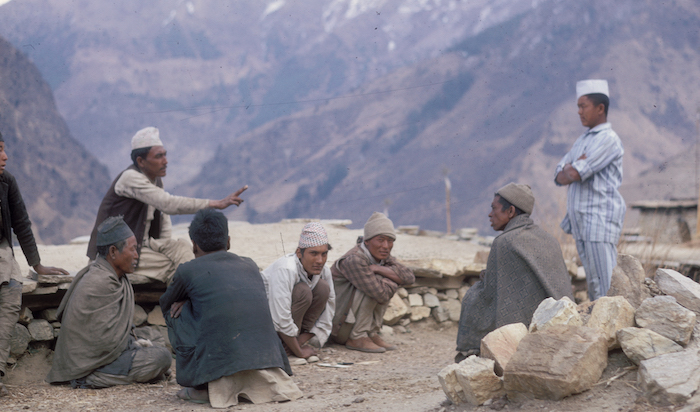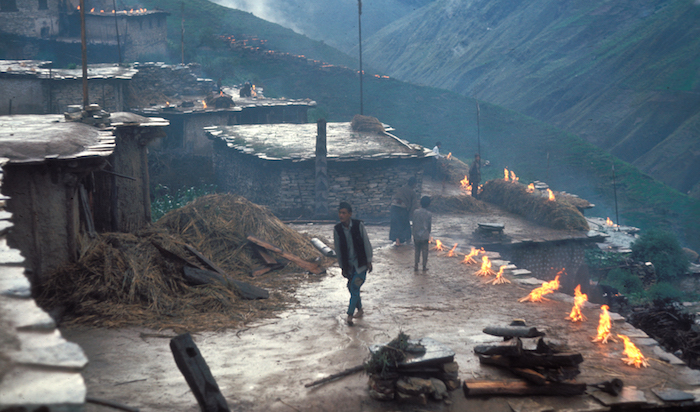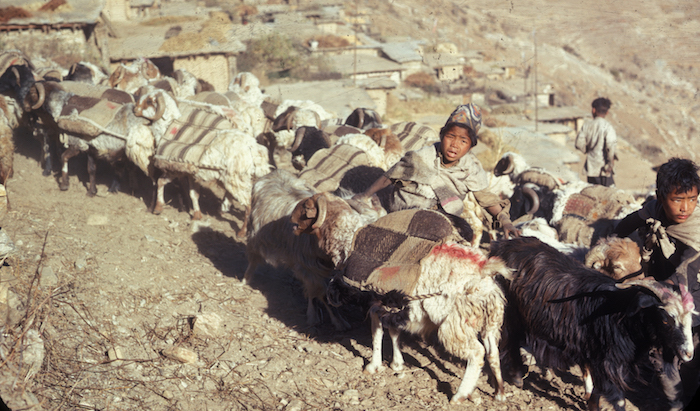Back in February of 2018, I wrote about Tarang, a remote village of farmers and traders in the Nepalese Himalayas that serves as a ‘hinge’ between its Nepali Hindu neighbors to the south and its Tibetan Buddhist neighbors to the north. Back in 1968, Tarang was undergoing many changes, one of which was the recent introduction of a new form of local government by the King. Let’s take a look, and see how local elections can make for fun adventures.

First, let’s look at the tiers of government in Tarang. The lowest level was the thalu. A thalu is a charismatic man who has a following and can use his respected status and base of support to get things done. Thalu was not an officially-recognized position, nor was it explicitly inherited. To become a thalu, you first had to prove your ability to lead, largely consisting of resolving disputes. Unsurprisingly for a village of 365 full-time residents, Tarang was riven by quarrels, misunderstandings, and petty vendettas. At any time, most residents had an active social feud with at least one other person. Resolving these disputes was the province of the thalu.
A few years before, the King of Nepal established a new form of local government nationwide: the panchayat (council). The valley in which Tarang is located had two panchayats: one for each side of the river. Tarang had two dedicated seats on its side’s 11-person panchayat. Plus, since Tarang was the largest village in the valley, it’s unsurprising that the panchayat’s two at-large seats were held by Tarangites. Each panchayat elected one delegate to send to the district panchayat, and each district panchayat elected a single delegate to send to the national panchayat in Kathmandu.
Before the introduction of a nationwide panchayat system, Tarangites avoided the national government to the greatest extent possible. But in 1968, thalus were spending the equivalent of up to $18,000 in 2018 money (an immense sum) on election campaigns to the local panchayat. Why? Two reasons. First, respect. Being elected to the local panchayat was an explicit recognition of the high esteem your community placed in you. The other reason was money. The delegate to the district panchayat got a small per diem to cover travel costs that increased with seniority. The district’s delegate to the national panchayat could earn $45,000 (in 2018 dollars) in per diem and stipends over his six-year term, plus whatever he could make in bribes.

Elections for Tarang’s two allotted seats on the eleven-member local panchayat were intense. That where the adventure hook comes in. Why get involved in local elections? Because an NPC the party is on good terms with (or even a fellow PC!) asks the PCs’ help, of course! If the PCs help her election campaign, she’ll owe them some serious favors even if she loses. And if she wins, she owes the PCs even more, and they can call upon her to get them out of difficult jams, or make possible the previously-impossible.
An election based on the Tarang system is super easy to run at the table because of the small population size and the presence of the thalus. Tarang had only 200 eligible voters (anyone 21 and up, regardless of sex or social status). Even the two at-large seats, which drew upon six other villages, had only 1,000 eligible voters. And even that small number can be further reduced if you break it down into a small number of voting blocs, each controlled by a thalu. Basically, at your table, you can run a local election like one in Tarang as determined by a half-dozen thalus the PCs must win over. You can absolutely win over some voters by doing something like slaughtering a goat and distributing its meat around the village, but the real voting power is in the hands of the thalus.
So how do you swing the thalus? Now, you could do it the way most traditional RPG videogames would do it, where each Thalu asks you to kill six snow moose or go into a dungeon. But if this election is occurring in a fleshed-out village with recurring NPCs your PCs will have to interact with again, it’s way more fun to have the PCs schmooze the thalus, cash in existing favors, or do them some fun favors. A thalu might ask the PCs to resolve a village dispute so the thalu gets the credit. Or a thalu might ask the PCs to make another thalu look bad, so he can siphon off some of their followers. (Maybe the PCs are asked to disrupt another thalu’s mediation efforts or shame the thalu publicly) The risk with that, of course, is that if the PCs are caught mid-scheme, that thalu will almost certainly marshall her followers against the party’s candidate.

Old man MacGruber was in a bad mood two months ago and said some things to his neighbor that he clearly didn’t mean. The neighbor is furious. Neither is currently speaking to the other. The neighbor is too proud to forgive words that were clearly not genuine, and old man MacGruber is too proud to apologize. If you want to make the issue a little more fantastical, old man MacGruber wasn’t in a bad mood. He was ensorcelled, and is too proud to admit it.
Old man MacLeod’s daughter got married last month. Before the wedding, the old man sold his brother a goat. His brother planned to sacrifice the goat at the wedding for good luck. Before old man MacLeod could hand it over, the goat died. His brother asked for his money back, but old man MacLeod had already spent the money on rice to serve at the wedding. The uncle of the bride was left without a goat to sacrifice at the wedding, which shamed him before the community. Both men feel insulted, but neither is too hung up on ‘winning’ this dispute. (Some solutions include old man MacLeod working off his debt, promising a set fraction of his trading profits next year, or just promising to pay the money back with interest after next year’s trading expedition. Or the brother could agree to write the whole thing off as a wedding present.)
Old man MacKenzie just died. He owned a plot of farmland adjacent to a plot owned by his stepdaughter (from his wife’s previous marriage) and another plot owned by his sister. Ordinarily, old man MacKenzie’s plot would pass to his oldest child, but he never had any. Both his stepdaughter and his sister are now claiming they are the rightful inheritors of the land. Neither is willing to split it. If you want to make the issue a little more fantastical, it’s not a plot of land, but rather a mine, and it’s currently infested with monsters.






